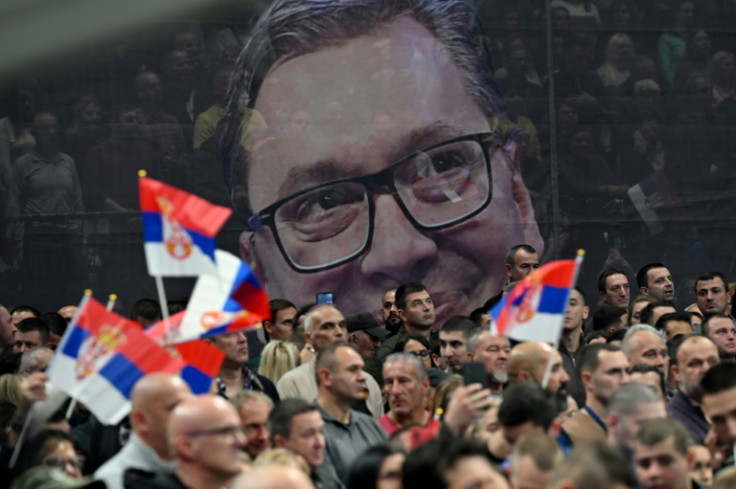
With cash handouts, pension rises and relentless appearances on state-backed media, Serbian President Aleksandar Vucic is looking to clinch another election victory on Sunday by leaning largely on his rural and impoverished base.
Among them is Jovanka Cvejic, an 81-year-old pensioner from Belgrade, who has long struggled to make ends meet on her meagre pension.
This year has been particularly tough with inflation averaging 12 percent battering her purchasing power, with a single trip to the grocery store eating away nearly a third of her monthly fixed income.
Despite the hard times, Cvejic's support for Vucic ahead of Sunday's parliamentary and local elections remains unwavering.
"I trust my president and I believe I will be able to survive," Cvejic told AFP.
For the past decade, Vucic has relied on votes from the likes of Cvejic to consolidate his control over the Balkan country.
Even as the president is despised by the urban, middle class for his alleged autocratic grip over Serbia's institutions, Vucic remains beloved by the country's poor and rural voters for his strongman persona and the stability he promises.
Earlier this year, tens of thousands took to the streets in major cities following back-to-back mass shootings, with the demonstrations quickly morphing into anti-government rallies that lasted for months.
A loose coalition of opposition parties -- under the Serbia Against Violence banner inspired by the protests -- have banded together hoping to challenge Vucic's ruling Serbian Progressive Party (SNS) at the polls.
And while Vucic will not be on the ballot in Sunday's elections, the votes are very much a referendum on Vucic and his ruling SNS.
"I believe that Serbia will stop developing if our president is gone," Milica, a SNS activist who refused to reveal her second name, told AFP.
Opinion polls are tipping the SNS to win again and stay in power, according to surveys.
"The media machinery that provides a merry vision of the future combined with the government waving money to raise pensions, is something that clearly brings success," said Vojislav Mihailovic, an analyst with the Belgrade-based Centre for Research, Transparency and Accountability (CRTA).
With Serbian broadcasters largely under his control, Vucic has free rein to trumpet his pension rises and handouts to voters.
In October, pensions were hiked by 5.5 percent, with promises from the government that another adjustment would be granted after the new year.
The rise is a welcome relief for hard-pressed pensioners, who on average have to live on the equivalent of 320 euros ($345) a month.
Every retired Serbian citizen also received a one-off payment of 20,000 dinars (170 euros) in late November.
The government is not just courting the elderly, with Vucic promising to provide every high school student in Serbia -- some 235,000 in total -- with a one-off handout of 10,000 dinars.
The moves followed a similar programme that saw the state give parents with children under the age of 16 10,000 dinars, and a campaign that slashed prices for select goods at grocery stores.
But the spending spree will have to be paid for, economists warn, saying Serbia will likely have taken loans to finance the handouts as it struggles with inflation and dismal economic growth.
"We don't have that money," Danica Popovic, a retired economics professor at Belgrade University, told AFP.
"This is purchasing votes, and the goal is to catch as many voters for the ruling party in the net."
But it has been hugely popular with Serbia's elderly, according to CRTA's Mihailovic, saying the group remains the "core" base of Vucic's SNS.
"In (Vucic), I see security and honesty," Milomir Petrovic, a 76-year-old pensioner from the remote village of Dljin, told AFP.
"There were better times, but I also remember worse times. I can live fine, normally now."







